
The United States Department of Justice has filed a motion to dismiss the lawsuit brought by the New Hampshire Lottery Commission (NHLC) over the DoJ’s revised opinion on the Wire Act.
In what is probably the biggest gaming news of the year so far, the Justice Department’s Office of Legal Counsel (OLC) published a new opinion on the Wire Act in January, though the opinion was officially issued in November of last year. It reverses the opinion the OLC wrote in late 2011, when it said that the Wire Act only bans interstate online sports betting, not all internet gambling. Prior to that 2011 opinion, the Justice Department had interpreted the Wire Act in a clearly incorrect way, saying it applied to all online gaming.
But reports were that Sheldon Adelson, the billionaire Republican mega-donor and CEO of the Las Vegas Sands Corp., got in the ear of the DoJ and influenced a new review of the Wire Act by the OLC. That new opinion said that all interstate online gambling, including sports betting and poker, is illegal.
Naturally, this stands to potentially threaten all internet gaming, even in states that have already legalized and regulated it. The NHLC filed a lawsuit in February, explaining how its ability to generate revenue via internet lottery sales and possibly even multi-state lotteries like Powerball and Mega Millions, would be hit hard.
The Commission also said that the opinion “is not faithful to the text, structure, purpose, or legislative history of the Wire Act,” “would also render the statute unconstitutionally vague, as well as unconstitutional under the First Amendment,” and “also intrudes upon the sovereign interests of the State of New Hampshire without unmistakably clear language demonstrating that Congress intended such a result.”
DOJ’s Motion
The DoJ’s motion to dismiss is an unwieldy 47 pages, so we aren’t going to get into it all here. But the upper-level arguments are as follows:
I. The Court Should Dismiss These Cases For Lack Of Standing.
II. Plaintiffs’ Claims Fail On The Merits Because Only One Of The Wire Act’s Four Prohibitions Is Limited To Sports Gambling.
III. Should The Court Rule Against Defendants, It Should Enter Exclusively Declaratory Relief.
IV. The Court Should Reject Amici’s Additional Arguments.
My favorite is the second bullet above, as it does its darndest to parse the language of the Wire Act in the Justice Department’s favor. Anyone who reads the Wire Act can see that it obviously says that internet sports betting is illegal and that’s it. Literally nobody I have shown it to thinks otherwise. But the DoJ ties itself in knots to explain why we are all wrong. Take a look at the first sub-heading under argument II, as well as its own sub-headings:
A. The Clear Text Of The Wire Act Shows That Only One Of Its Four Prohibitions Is Limited To Sports Gambling.
1. The Sports-Gambling Modifier Does Not Travel Backwards To Apply To The First Prohibition Of The First Clause.
2. The Sports-Gambling Modifier Does Not Travel Forwards To Apply To Either Prohibition Of The Second Clause.
3. Additional Textual Evidence Within The Wire Act Confirms That The Statute Is Not Exclusively Limited To Sports Gambling.
So let me get this straight. The DoJ says that the Wire Act’s text is “clear” in showing that it applies to all online gambling, yet the explanation of how it is clear is so complex that we are talking about modifiers traveling backwards and forwards for several pages? Methinks that perhaps the interpretation the DoJ wants is not so clear.
Arguments in the case are slated to start on April 8th, 2019.























